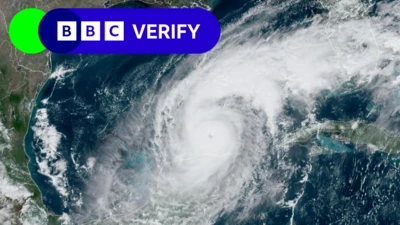We've updated our Privacy and Cookies Policy
We've made some important changes to our Privacy and Cookies Policy and we want you to know what this means for you and your data.
Mexico arrests man with 18 monkeys around his waist
- Author, Julian Miglierini
- Role, ±«Óătv News, Mexico
Mexican authorities have arrested a man who was trying to smuggle 18 small monkeys into the country by carrying them in his clothing.
Roberto Sol Cabrera, a Mexican citizen, was stopped at a random check at Mexico City's international airport after arriving from Lima.
In a statement, police said Mr Cabrera Zavaleta had been behaving "nervously".
Once he was searched, it was discovered that he had hidden 18 titi monkeys in a girdle around his waist.
After his arrest, Mr Sol Cabrera confessed that the animals had travelled in his luggage, and that he had put them under his clothing "to protect them from X-rays" as he was going through customs.
The animals had been put into socks, police explained, and two of them were dead at the time of confiscation.
Many species of titi monkeys, a species from South America, are in an endangered animal list by the Convention on International Trade in Endangered Species of Wild Fauna and Flora (Cites).
The Mexican government recently restricted imports of primates and since Mr Sol Cabrera did not have any permits, he will remain in custody while more investigations take place.
'Tradition'
In a video published by the Mexican Public Security agency, Mr Sol Cabrera says he had paid $30 (ÂŁ19.70) for each specimen in Peru.
According to estimates, monkeys like the ones confiscated in the airport could have been sold for between $775 (ÂŁ509) and $1,550 (ÂŁ1,018) in Mexico.
Adrian Reuter, local representative for Traffic - an international organization that monitors wildlife trade - told the ±«Óătv that animal trafficking is a serious problem in Mexico.
"The reasons are two: one, because Mexico is an important route for those who want to smuggle animals into the US, and the other, because, as in other countries of Latin America, there is a deep-rooted tradition of having wild animals as pets," he said.
The Sonora market, in the Mexican capital, is known to sell parrots, monkeys or reptiles for private owners.
Mr Reuter recognizes that in the last few years, the Mexican government has improved efforts on fighting animal-trafficking criminal networks, rather than focusing on the citizens who want to have "a parrot for company", he says.
Top Stories
More to explore
Most read
Content is not available








